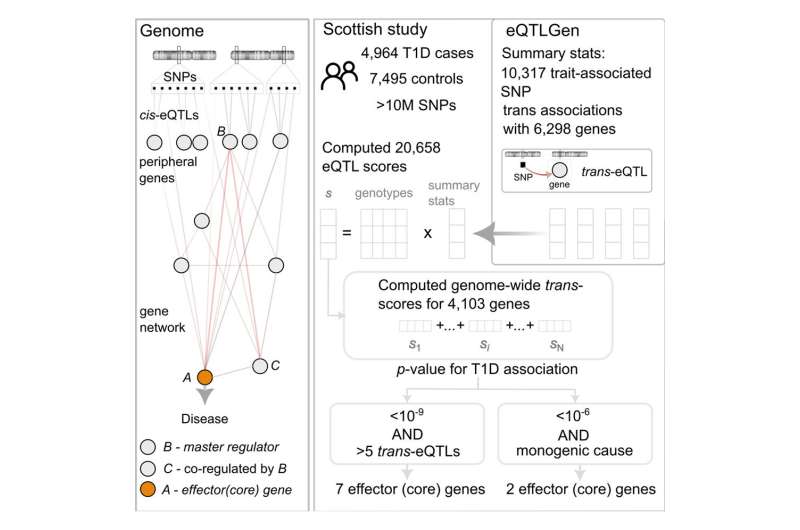
Scientists have identified nine genes that play a key role in increasing the risk of developing type 1 diabetes. Only four of the genes identified have previously been linked to type 1 diabetes in humans. Experts say the findings could lead to the development of new therapies to prevent and treat the condition, which affects an estimated 400,000 people in the U.K.
A new theory of the genetics of diseases divides genes into two main categories: core genes that have a direct impact on the development of disease, and regulator genes which have an indirect impact through their interaction with core genes.
This is the first time core genes have been identified for type 1 diabetes.
To pinpoint the core genes, researchers from the University of Edinburgh used a new approach that explored the effect of common variants—changes to the DNA sequence—on genes throughout the genome.
Common variants
Humans are 99.9% identical in their genetic makeup. The 0.1% difference is caused by insertions, deletions and substitutions in the DNA sequence.
These variations can affect the function of genes, with some more frequent across the population than others.
Previous studies exploring the link between common variants and type 1 diabetes have focused on the impact of any genetic code changes on genes located nearby. These are known as “cis-” effects.
The research team investigated the impact of common variants on the activity of genes located further away. These long-range influences of variants are known as “trans-” effects.
By adding up the long-range effects of several common variants, the research team found that their impact was focused on a small number of core genes.
Experts say that the method could also be applied to detect core genes in other conditions where common variants are known to cause disease.
Immune system
Almost all of the genes identified in the study are involved in the immune system, which normally protects the body from infections.
In type 1 diabetes, the immune system mistakenly attacks the cells responsible for producing the hormone insulin, which usually acts to regulate blood sugar levels.
The findings reveal promising targets for new drugs to prevent or reverse the autoimmune damage to the cells that produce insulin, experts say.
The research team studied almost 5,000 people diagnosed with type 1 diabetes and 7,500 healthy individuals in Scotland, from the Scottish Diabetes Research Network Type 1 Bioresource and the Generation Scotland study. The findings are published in the American Journal of Human Genetics.
“At the beginning of the genome era in 2000, it was envisaged that the discovery of genes through which common variants cause disease would rapidly lead to development of new drugs. Until now this has been disappointing. Studying the short-range effects of these variants on nearby genes has rarely identified promising drug targets. We have focused instead on the long-range ‘trans-‘ effects of these risk variants on genes elsewhere on the genome. This identifies what appear to be core genes for type 1 diabetes, some of which are possible drug targets,” says Professor Paul McKeigue.
More information:
Andrii Iakovliev et al, Genome-wide aggregated trans-effects on risk of type 1 diabetes: A test of the “omnigenic” sparse effector hypothesis of complex trait genetics, The American Journal of Human Genetics (2023). DOI: 10.1016/j.ajhg.2023.04.003
Journal information:
American Journal of Human Genetics
Source: Read Full Article



